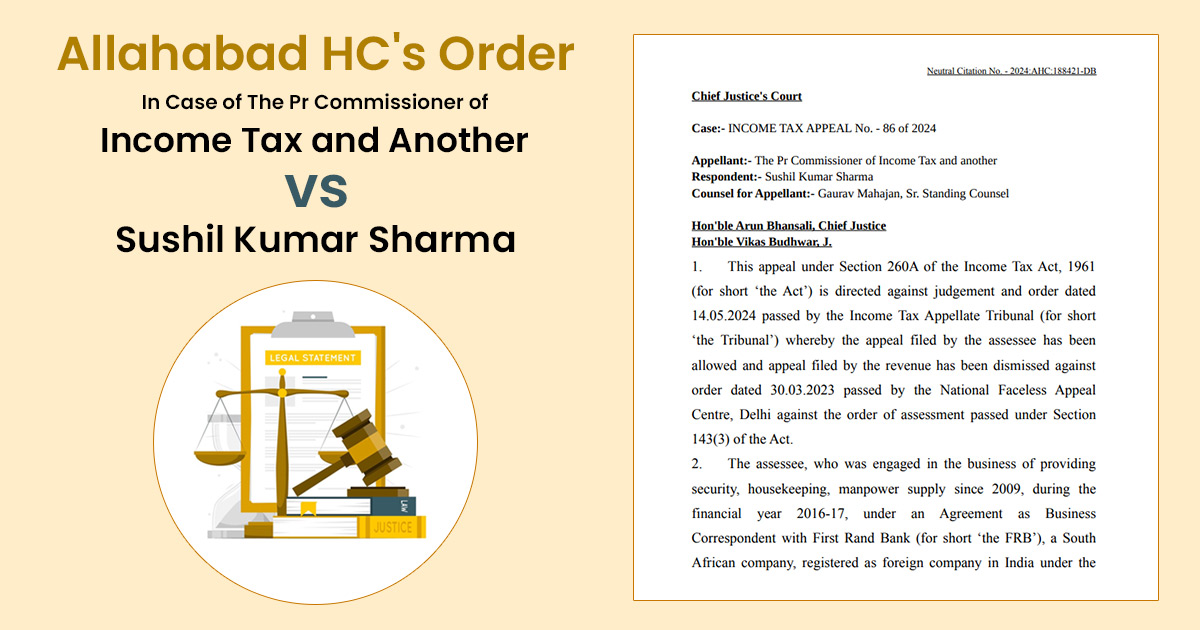
It was carried by the Allahabad High Court that the finding of the Income Tax Appellate Tribunal and Commissioner of Income Tax (Appeals) that when an agreement between parties establishes a direct transfer of money, accomplishing so indirectly by holding the funds in a distinct account before sending them to the final account, does not place the money under the meaning of ‘unexplained money’ as per Section 69A of the Income Tax Act, 1961.
Chief Justice Arun Bhansali and Justice Vikas Budhwar said that “The CIT(A) and the Tribunal were justified in coming to the conclusion that only on account of purported infraction of the Agreement between the FRB and the assessee, without there being any dispute regarding the amount collected by the assessee, which, in turn, has been deposited with the FRB, the deposits in the bank account of assessee cannot be termed as unexplained cash deposits by the assessee.”
The Case Facts
The business of the taxpayer is to supply security, housekeeping, and manpower. In FY 2016-17, he entered into an agreement with the First Rand Bank (F.R.B.) to furnish the manpower to collect the loan instalment via micro borrowers. The management was that the taxpayer shall collect the money through distinct borrowers and would deposit it in his own bank account, which thereafter gets deposited into the account of the F.R.B.
In the assessment proceedings, the assessing officer asked for explanations for the large cash deposits in the taxpayer’s account who furnished the documents to assist distinct transactions. However, AO discovered that the total income of the taxpayer exceeds the shown income when including cash deposits as income u/s 69A of the Income Tax Act, 1961.
An appeal was filed by the taxpayer to the principal commissioner of tax, who, on comprehending his business model, removed the additional cash deposits from the total income computed via the AO. All the additions have been removed by PCIT except for those stemming from the period of demonetization. Dissatisfied, both the taxpayer and the department filed pleas against it.
The tribunal has analysed the agreement between the taxpayer and FRB which cited that the taxpayer was required to deposit the total collected amount with the bank; it was immaterial that he did not hand the same to them directly. Particularly under the fact that the parties to the agreement were not in dispute for the same.
As per the Tribunal, the department does not have any reason to compute the taxpayer’s income based on the contention that the taxpayer does not deposit the money into the bank account.
Also, it carried that the exclusion performed via the PCIT of the amount deposited by the taxpayer was not explained. It cited that the revenue does not make the matter that the taxpayer does not obtain the specified bank notes via the customers of the bank, and hence it cannot be condoned.
After that, PCIT furnished the present plea to the HC, claiming that the Tribunal was not explained in passing the impugned order. It claimed that the wrong use of the agreement between the taxpayer and the bank draws section 69A of the Act and was a breach of the agreement itself, providing rise to a substantial question of law.
Decision of High Court
It was carried by the court that the PCIT and the Tribunal have recorded the AO objection for the agreement and were right in carrying that the large cash deposits in the taxpayer’s account cannot be termed as unexplained cash deposits. It was held that the fact-finding of both the aforementioned bodies does not furnish a substantial question of law.
The court for the demonetization period carried that the PCIT had rejected the plea on the only assumption that the taxpayer had not been allowed to collect the money in the specified bank notes, a finding that was overturned by the Tribunal. It was carried that these transactions had been performed by the taxpayer previously and has been accepted by the PCIT before this.
The court held that “The findings recorded by the Tribunal, align with the material available before it and by no stretch of imagination the deposits received by the respondent assessee from the micro borrowers of the FRB can be termed as unexplained cash deposits in his bank account. The findings recorded by the Tribunal do not give rise to any substantial question of law.”
Consequently, The Appeal was Dismissed
3rd party: Income Tax Act Placing Funds In One Account Before Transferring It To Another Does Not Attract S. 69A: Allahabad High Court
It was carried by the Allahabad High Court that the finding of the Income Tax Appellate Tribunal and Commissioner of Income Tax (Appeals) that when an agreement between parties establishes a direct transfer of money, accomplishing so indirectly by holding the funds in a distinct account before sending them to the final account, does not place the money under the meaning of ‘unexplained money’ as per Section 69A of the Income Tax Act, 1961.
| Case Title | The Pr Commissioner of Income Tax and Another vs. Sushil Kumar Sharma |
| Income Tax Appeal | 86 of 2024 |
| Date | 27.11.2024 |
| Counsel For Appellant | Gaurav Mahajan, Sr. Standing Counsel |
| Allahabad High Court | Read Order |









